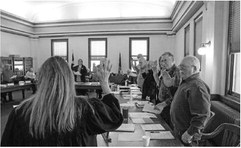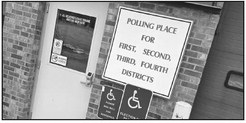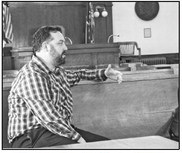Where do we go from here?


Star News
Editorials
Last week members of the Taylor County Board approved a compromise budget calling for the radical and extraordinary measure of keeping the status quo.
The compromise restored cuts proposed by the county’s budget committee to the revenue-generating forestry department, helped keep management of housing assistance programs from being outsourced to Spooner as well as reversing a morale-destroying change to the county employee’s health insurance offerings. All this was done while keeping the increase to the property tax levy below the rate of inflation — a substantial feat considering the increase in costs of road material, vehicles and equipment over the past year.
The deal came with the promise of creating a select committee to go through each department over the coming year with the goal of cutting about $500,000 in expenses (read: staff positions and services). Supervisor Mike Bub, who brokered the budget deal warned that there would be no sacred cows when it came to the reviews, with the exception of those services and positions mandated by state law.
The end goal of this exercise is to seek to eliminate the need to use short-term borrowing for some of the county’s road projects to circumvent the state-imposed revenue caps. This short term borrowing is a common practice in counties across the state. The county will borrow the money in December and pay it off entirely by April after the tax settlement with the municipalities. This works because debt service is outside the revenue cap and the state lets it all be paid for in one year. While this work-around is a common practice across the state to solve the state-created revenue crisis, the process is distasteful to the strongly debt-adverse conservative members on the Taylor County Board.
Instead, some as-yet-to-be named committee will have the unenviable task of deciding what services — and county employees — are non-essential and who can be shown the door. Whether the cuts will come through compassionate austerity and the elimination of vacant positions or through county employees being shown the door, those involved in the process will have to walk the line between being fact-finding and a witch hunt.
Regardless, if the committee is successful in securing $500,000 in cuts to county personnel and services to reduce the levy and avoid having to use short term borowing, the board will be able to pat itself on the back for saving the average residential homeowner in the county about $55 in local property taxes.
The question voters need to ask is where do we go from here? Should the goal be a never-ending cycle of cuts and reduction of services to keep the tax burden the same? Or is there a different way where voters stand up to Madison and demand that local elected leaders be able to set local budgets based on local needs and not by some arbitrary formula?




